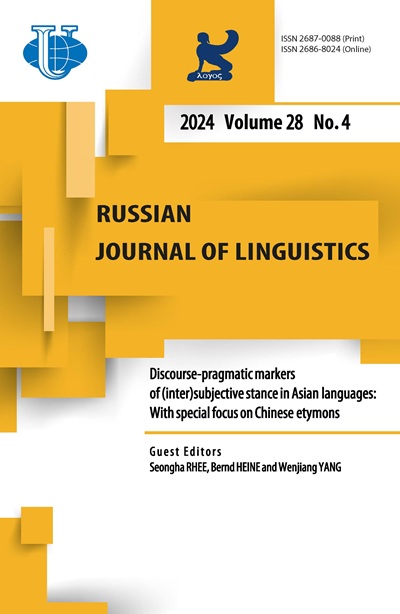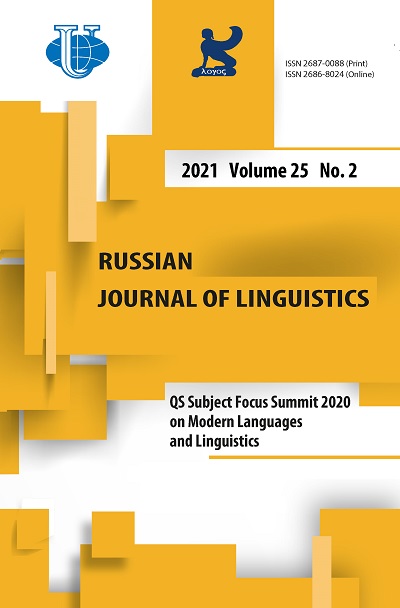Динамика современных переводческих исследований сквозь призму полидисциплинарности: проблемы и перспективы
- Авторы: Беднарова-Гибова К.1
-
Учреждения:
- Прешовский университет
- Выпуск: Том 25, № 2 (2021): QS саммит 2020 по предметным областям «Современные языки» и «Лингвистика»
- Страницы: 462-477
- Раздел: Статьи
- URL: https://journals.rudn.ru/linguistics/article/view/26801
- DOI: https://doi.org/10.22363/2687-0088-2021-25-2-462-477
Цитировать
Полный текст
Аннотация
В статье обсуждается состояние современного переводоведения, обусловленное его полидисциплинарностью, которая, с одной стороны, играет созидательную роль, а с другой - создает определенные сложности. Цель данного аргументативного обзора - рассмотреть перспективы и противоречия современных переводоведческих исследований, связанные с полидисциплинарностью, используя методы рефлексивной интроспекции, синтеза и оценки. Эта трактовка основана на интегративном подходе М. Снелл-Хорнби (Snell-Hornby 1988/1995), а также ряде культурных, идеологических, когнитивных, антропологических, технологических и экономических факторов. В статье затрагиваются четыре проблемы, обусловленные полидисциплинарностью в переводоведении: a) столкновение между гносеологическим ядром переводоведческой теории, противостоящим расширению границ метадисциплины и интердисциплинарностью; б) противоречие между научным сообществом - «Башней из слоновой кости» - и повседневной лингвистической практикой; в) размывание внешних и стирание внутренних границ в теории перевода; г) наличие множественных подходов к переводоведению, выдвигающих на первый план его абстрактные либо прикладные аспекты. С учетом внутренних установок в теории перевода предлагаются два возможных пути развития: утверждение значимости перевода для других дисциплин и внедрение его достижений в практику перевода в соответствии с подходом К. Цвишенбергер (Zwischenberger 2019). Продолжение развития можно увидеть в постпереводческих исследованиях Э. Гентцлера (Gentzler 2017), направленных на изучение допереводческой культуры и влияние результатов перевода на культуру языка перевода. Не будучи склонным к крайностям, автор статьи, тем не менее, утверждает, что истинная междисциплинарность переводоведения требует конструктивного и взаимообогащающего диалога с другими дисциплинами, а также взаимосвязи теории и практики, с учетом реальной действительности, что сделает теорию перевода жизнеспособной.
Об авторах
Клаудиа Беднарова-Гибова
Прешовский университет
Автор, ответственный за переписку.
Email: klaudia.gibova@unipo.sk
ORCID iD: 0000-0002-6555-4464
доцент отделения переводоведения Института британских и американских исследований, Университет Прешов, Словакия. Она активно занимается переводоведением, является профессиональным переводчиком специальных текстов с английского языка на немецкий и наоборот. Основная область исследований включает юридический перевод, институциональный (официальный) перевод, контрастивное изучение лингвистической терминологии и социологии перевода. Недавно она начала заниматься проблемами психологии перевода, в особенности аффективностью поведения переводчика. Ряд ее работ опубликован в ведущих переводоведческих журналах, таких как Meta, Perspectives, The Translator и Translation Studies.
Прешов, Республика СловакияСписок литературы
- Bassnett, Susan. 2014. Translation studies at a cross-roads. In Elke Brems, Reine Meylaerts & Luc van Doorslaer (eds.), The Known Unknowns of Translation Studies, 17-27. Amsterdam/Philadelphia: John Benjamins.
- Bassnett, Susan. 2017. Foreword. In Edwin Gentzler (eds.), Translation and Rewriting in the Age of Post-Translation Studies, viii-x. London/New York: Routledge.
- Bassnett, Susan & André Lefevere. 1990. Translation, History and Culture. London/New York: Pinter Publishers.
- Bassnett, Susan & Anthony Pym. 2017. On the direction of Translation Studies. Cultus: the Journal of Intercultural Mediation and Communication 10 (1). 145-152.
- Bednárová-Gibová, Klaudia. 2018. More recent avenues of research in contemporary translation studies. In Lucyna Harmon and Dorota Osuchowska (eds.), Translation Studies across the Boundaries, 15-30. Berlin: Peter Lang.
- Bednárová-Gibová, Klaudia. 2021. Organizational ergonomics of translation as a powerful predictor of translators’ happiness at work? Perspectives: Studies in Translation Theory and Practice 29 (3). 391-406. DOI: https://doi.org/10.1080/0907676X.2020.1753788
- Boase-Beier, Jean. 2006. Loosening the grip of the text: Theory as an aid to creativity. In Manuela Perteghella & Eugenia Loffredo (eds.), Translation and Creativity. Perspectives on Creative Writing and Translation Studies, 47-56. London/New York: Continuum.
- Brems, Elke, Reine Meylaerts & Luc van Doorslaer. 2014. Translation studies looking back and looking forward. A discipline’s meta-reflection. In Elke Brems, Reine Meylaerts & Luc van Doorslaer (eds.), The Known Unknowns of Translation Studies, 1-16. Amsterdam/Philadelphia: John Benjamins.
- Cronin, Michael. 2010. The translation crowd. Revista Tradumàtica: tecnologies de la traducció 8. 1-7. DOI: https://doi.org/10.5565/rev/tradumatica.100
- Chesterman, Andrew & Rosemary Arrojo. 2000. Shared ground in translation studies. Target 12 (1). 151-160. DOI: https://doi.org/10.1075/target.12.1.08che
- Chesterman, Andrew. 2007. Bridge concepts in translation sociology. In Michaela Wolf & Alexandra Fukari (eds.), Constructing a Sociology of Translation, 171-183. Amsterdam/Philadelphia: John Benjamins.
- Chesterman, Andrew. 2019. Moving conceptual boundaries: so what? In Helle V. Dam, Matilde Nisbeth Brǫgger & Karen Korning Zethsen (eds.), Moving Boundaries in Translation Studies, 12-25. London/New York: Routledge.
- El-dali, Hosni Mostafa. 2011. Towards an understanding of the distinctive nature of translation studies. Journal of King Saud University - Languages and Translation 23 (1). 29-45. DOI: https://doi.org/10.1016/j.jksult.2010.01.001
- Gambier, Yves. 2014. Changing landscape in translation. International Journal of Society, Culture & Language 2 (2). 1-12.
- Gambier, Yves. 2016. Rapid and radical changes in translation and translation studies. International Journal of Communication 10. 887-906. https://ijoc.org/index.php/ijoc/article/view/3824 (accessed 18 November 2020).
- Gentzler, Edwin. 2003. Interdisciplinary connections. Perspectives 11 (1). 11-24. DOI: https://doi.org/10.1080/0907676X.2003.9961458
- Gentzler, Edwin. 2017. Translation and Rewriting in the Age of Post-Translation Studies. New York: Routledge.
- Göpferich, Susanne. 2011. From multidisciplinarity to transdisciplinarity: The investigation of competence development as a case in point. In MikaEL electronic proceedings of the KäTu Symposium on Translation and Interpreting Studies 5, 1-24. http://www.sktl.fi/@Bin/85366/Gopferich_MikaEL2011.pdf (accessed 21 December 2020).
- Grbić, Igor. 2013. Translation vs. cislation: should the reader be pampered or challenged? In
- Ivana Živančević Sekeruš (eds.), Sixth International Interdisciplinary Symposium Meeting of Cultures 2. 773-780. Novi Sad: University of Novi Sad, Faculty of Philosophy.
- Holmes, James. 1988/2004. The name and nature of translation studies. In Lawrence Venuti (eds.), The Translation Studies Reader. 2nd edn., 180-192. London/New York: Routledge.
- Jakobson, Roman. 1959/2012. On linguistic aspects of translation. In Lawrence Venuti (eds.), The Translation Studies Reader. 3rd edn., 126-131. London/New York: Routledge.
- Kaindl, Klaus. 1999. Interdisziplinarität in der Translationswissenschaft: Theoretische und
- methodische Implikationen. In Alberto Gil, Johann Haller, Erich Steiner and Heidrun
- Gerzymisch-Arbogast (eds.), Modelle der Translation: Grundlagen für Methodik, Bewertung, Computermodellierung, 137-155. Frankfurt am Main: Peter Lang.
- Leech, Geoffrey & Mike Short. 1981/2007. Style in Fiction: A Linguistic Introduction to English Fictional Prose. London: Longman.
- Leech, Geoffrey. 2008. Language in Literature: Style and Foregrounding. London: Routledge.
- Lefevere, André. 1992. Translation, Rewriting and Manipulation of Literary Fame. London/ New York: Routledge.
- Liu, Jinhui & Jun Wen. 2018. Review of [Gentzler, Edwin (2017). Translation and Rewriting in the Age of Post-Translation Studies. New York: Routledge]. Meta 63 (1). 267-269. DOI: https://doi.org/10.7202/1050530ar
- Munday, Jeremy. 2016. Introducing Translation Studies. 4th edn. London: Routledge.
- Nord, Christiane. 2005. Text Analysis in Translation: Theory, Methodology and Didactic Application of a Model for Translation-oriented Text Analysis. 2nd edn. Amsterdam: Rodopi.
- Odacıoğlu, Mehmed Cem & Şaban Köktürk. 2015. From interdisciplinarity to transdisciplinarity in translation studies in the context of technological tools & localization industry. International Journal of Comparative Literature & Translation Studies 3 (3). 14-19. https://www.journals.aiac.org.au/index.php/IJCLTS/article/view/1648 (accessed 21 December 2020).
- Rogers, Margaret. 2019. From binaries to borders. In Helle V. Dam, Matilde Nisbeth Brǫgger & Karen Korning Zethsen (eds.), Moving Boundaries in Translation Studies, 151-167. London/New York: Routledge.
- Sdobnikov, Vadim V. 2019. Translation studies today: Old problems and new challenges. Russian Journal of Linguistics 23 (2). 295-327. DOI: https://doi.org/10.22363/2312-9182-2019-23-2-295-327 .
- Shadman, Nazanin, Masood Khoshsaligheh & Reza Pishghadam. 2019. Iranian literary translators’ emotional intelligence: Description of facets. SKASE Journal of Translation and Interpretation 12 (1). 29-47. http://www.skase.sk/Volumes/JTI16/pdf_doc/03.pdf (accessed 18 November 2020).
- Snell-Hornby, Mary. 1988/1995. Translation Studies: An Integrated Approach. Amsterdam/ Philadelphia: John Benjamins.
- Snell-Hornby, Mary. 2006. The Turns of Translation Studies. New Paradigms or Shifting Viewpoints? Amsterdam//Philadelphia: John Benjamins.
- van Doorslaer, Luc. 2019. Bound to expand. The paradigm of change in translation studies. In Helle V. Dam, Matilde Nisbeth Brǫgger & Karen Korning Zethsen (eds.), Moving Boundaries in Translation Studies, 220-230. London/New York: Routledge.
- Wolf, Michaela & Alexandra Fukari (eds.). 2007. Constructing a Sociology of Translation. Amsterdam/Philadelphia: John Benjamins.
- Wolf, Michaela. 2014. The sociology of translation and its ‘activist turn’. In Claudia Angelelli (eds.), The Sociological Turn in Translation and Interpreting Studies, 7-21. Amsterdam/Philadelphia: John Benjamins.
- Wolf, Michaela. 2017. A “performative turn” in translation studies? Reflections from a sociological perspective. Transcultural 9 (1). 27-44.
- Wing-Kwong Leung, Matthew. 2006. The ideological turn in translation studies. In João Ferreira Duarte, Alexandra Assis Rosa & Teresa Seruya (eds.), Translation Studies at the Interface of Disciplines, 129-144. Amsterdam/Philadelphia: John Benjamins.
- Wright, Chantall. 2016. Literary Translation. London/New York: Routledge.
- Zwischenberger, Cornelia. 2019. From inward to outward: the need for translation studies to become outward-going. The Translator 25 (3). 256-268. DOI: https://doi.org/10.1080/13556509.2019.1654060
- Baudrillard, Jean. 1981/1994. Simulacra and Simulation [online]. Ann Arbor, MI: University of Michigan Press. DOI: https://doi.org/10.3998/mpub.9904 (accessed 9 November 2020)
- Massey, Gary. 2020. Moving from interdisciplinarity to transdisciplinarity: Research in translation studies. A talk given at the QS Subject Focus Summit - Modern Languages & Linguistics: Languages and Migration in a Globalized World on December 15, 2020, https://qssubjectfocus.com/moscow-2020/speakers (accessed 21 December 2020)

















